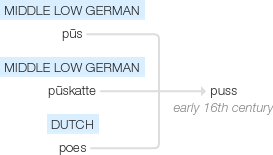Puss
early 16th century: probably from Middle Low German pūs (also pūskatte ) or Dutch poes, of unknown origin.
wiktionary
Probably from Middle Low German pūs, pūskatte or Dutch poes(“puss, cat”, slang for “vulva”), ultimately from a common Germanic word for cat, perhaps ultimately imitative of a sound made to get its attention (compare Arabic بسة).
Akin to West Frisian poes, Low German Puus, Puuskatte, Danish pus, dialectal Swedish kattepus, Norwegian pus.
Found also in several other European, North African and West Asian languages; compare Romanian pisică and Sardinian pisittu.
Of Celtic origin, from or akin to Irish pus(“mouth, lip”), from Middle Irish bus.
puss ( uncountable)
etymonline
puss (n.1)
"cat," 1520s, but probably much older than the record, perhaps imitative of the hissing sound commonly used to get a cat's attention or the noise made by the cat in hissing. The same or similar sound is a conventional name for a cat in Germanic languages and as far off as Afghanistan; it is the root of the principal word for "cat" in Rumanian (pisica) and secondary words in Lithuanian (puž, word used for calling a cat), Low German (puus), Swedish dialect katte-pus, Irish puisin "a kitten," etc.
Applied to a girl or woman from c. 1600, originally in a negative sense, implying unpleasant cat-like qualities, but by mid-19c. in affectionate use.
The little puss seems already to have airs enough to make a husband as miserable as it's a law of nature for a quiet man to be when he marries a beauty. ["George Eliot," "Adam Bede," 1859]
Children's game puss-in-the-corner is attested by that name by 17-9.
puss (n.2)
"the face" (but sometimes, especially in pugilism slang, "the mouth"), especially when sour-looking or ugly, 1890, slang, from Irish pus "lip, mouth."
